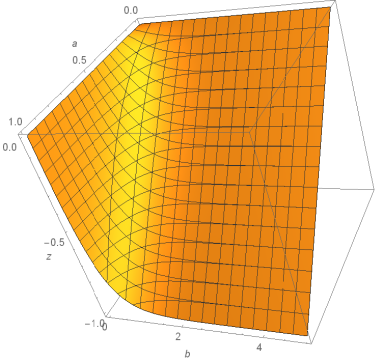The equation is a typical example of a transcendental equation and, as such, it has no analytic solution for symbolic $a,b$. That being said, it does admit an asymptotic expansion for small $a$ (or large $b$), which converges rapidly enough:
$$
z_\star=\tanh(b) \sum_{i=1}^\infty P_i(\operatorname{sech}(b)) a^i
$$
where the polynomials $P_i$ are given by
$$
\begin{aligned}
P_1(x)&=-1\\
P_2(x)&=-x^2\\
P_3(x)&=x^2 - 2 x^4\\
&\cdots
\end{aligned}
$$
P[1][x_] := -1;
P[2][x_] := -x^2;
P[3][x_] := x^2 - 2 x^4;
P[4][x_] := -((2 x^2)/3) + (14 x^4)/3 - 5 x^6;
P[5][x_] := x^2/3 - (19 x^4)/3 + 19 x^6 - 14 x^8;
P[6][x_] := -((2 x^2)/15) + (94 x^4)/15 - (199 x^6)/5 + (224 x^8)/3 - 42 x^10;
P[7][x_] := 1/45 x^2 (2 - 222 x^2 + 2673 x^4 - 9608 x^6 + 13050 x^8 - 5940 x^10);
P[8][x_] := 1/315 x^2 (-4 + x^2 (1020 - 11 x^2 (1998 + x^2 (-12272 + 945 x^2 (32 - 34 x^2 + 13 x^4)))));
P[9][x_] := 1/315 (x^2 - 575 x^4 + 21417 x^6 - 211423 x^8 + 841685 x^10 - 1567335 x^12 + 1366365 x^14 - 450450 x^16);
a Tanh[z - b] == z /. z -> Tanh[b] Sum[P[i][Sech[b]] a^i, {i, 1, 9}] + O[a]^10 // Simplify
--
For example, if we take $a=1/\pi$ and $b=e$, then the numerical solution is $z_\star=-0.316842\dots$, to be compared with the four first truncations of the asymptotic solution:
$$
\color{red}{-0.31}5550\\
\color{red}{-0.31}7284\\
\color{red}{-0.316}751\\
\color{red}{-0.3168}54\\
$$
--
FWIW, it appears that
$$
\begin{aligned}
P_j(x)&=-\frac{2^{2j-2} \left(\frac{1}{2}\right)_{j-1} }{j!}x^{2 j-2}\\
&+\frac{2^{2 j-5} (j-2) (5 j-6) \left(\frac{3}{2}\right)_{j-3} }{3 j!}x^{2 j-4}\\
&-\frac{2^{2 j-9} (j-3) \left(125 j^3-783 j^2+1552 j-960\right) \left(\frac{5}{2}\right)_{j-5} }{15 j!}x^{2 j-6}+\cdots
\end{aligned}
$$
where $(\alpha)_\beta$ denotes the Pochhammer function. It would be interesting to study whether one can find the general form of $P_j$ and, perhaps, resum the series.


aor something like that) $\endgroup$